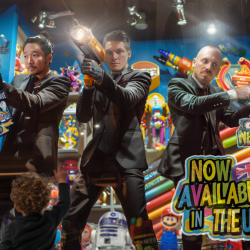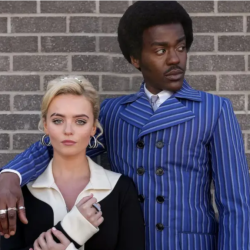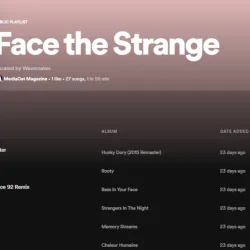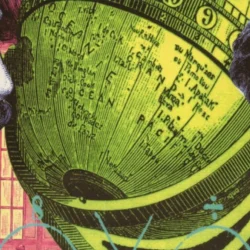In 2010/11, we were working on a Super Bowl spot for BMW for its new diesel 3 Series, which was apparently much cleaner and quieter than other diesel cars. The spot opens with old-looking footage in which old cars and trucks belch thick black smog, the drivers coughing plumes of fumes. Suddenly a shiny BMW roars into view and the film resolves into the bright and clean world it is ushering in with some kind of advanced diesel technology.
At the end it easily pulls past a car from the past as the inhabitants look on in awe and envy. At that moment the chorus of the soundtrack kicks in. “Turn and face the strange…Ch-ch-changes”. The name of the ad, indeed the whole concept, hinges on the choice of the soundtrack by David Bowie. The track cost a significant sum to license but Super Bowl spots cost about $250k per second in media alone so they tend to have big production budgets too.
I tried to convince the CCO and client that we should release it online before the game. I had a rationale for this. The year before, Google had launched their first ever Super Bowl spot, Parisian Love, to great plaudits. In a Googly fashion, the Google Creative Lab had worked with a group of students from advertising and design schools to produce a few different spots, and released them all online. At the last minute they decided to use the one that performed best online at the Super Bowl.
I failed to convince the team in part because it simply wasn’t the done thing at the time. Agencies were obsessed with debuting their biggest ideas on the biggest stage possible. That year, VW released The Force online, for a practical reason. They had a 60-second cut they thought was stronger but only had a 30-second slot in the game.
Time Magazine wrote that it “changed Super Bowl commercials forever”, because it has become commonplace to launch spots online before the game. As VW’s head of marketing said “It’s hard to think about now, but at the time, it was not the conventional wisdom to air or put online a commercial that was meant for the Super Bowl. The wisdom was you hold it, because you would get the most value out of that impression by waiting.” The Force is still to this day the most shared Super Bowl commercial of all time.
It’s hard to face the strange
To do, or appreciate, things that are too outside our understanding of the norms. There is, by definition, no playbook or best practices. It is inherently risky and you can’t point to other examples to show how it might work. Thus the impossibility of that common client request: ‘give me something that has never been done before — but show me that it will work’. Even Bowie’s Artpop banger ‘Changes’ was too far out when it was originally released, at least by commercial standards. The single and album flopped and failed to chart in the UK.
It was only after the success of his next album, Ziggy Stardust and the Spiders of Mars, that Hunky Dory blew up retrospectively. People needed time to get familiar with Bowie’s new groove, but he kept reinventing himself throughout his career. Sometimes fans kept up and sometimes they didn’t, that’s the price of being an innovator. If you push past the MAYA (most advanced yet acceptable) boundary, it’s hard to gain acceptance. The second verse in Changes is about intergenerational clashes. Bowie spoke about this in an interview with The Times in 1968: “We feel our parents’ generation has lost control, given up, they’re scared of the future. I feel it’s basically their fault that things are so bad.”
Plus ça change
Fifty years later young people express similar sentiments, perhaps they always will. Regardless, there are big, societal issues today that deeply concern young consumers, which impacts how they think about brands and marketers have begun to worry about this. A recent survey by the CIM reported that 91% of UK marketers believe their brands have to evolve and more than a quarter think a radical overhaul of their business model is required just to survive. The CEO of the CIM said: “We are living through extremely turbulent times; from the pandemic and the ongoing climate crisis — to rising inflation, and most recently the Ukraine crisis. It’s clear from today’s results that consumers now expect brands to do more than just deliver value, but also actively engage with societal and political issues.”
Whilst a survey of marketers perhaps isn’t the best way to prove that consumers expect brands to engage with social issues, there are innumerable studies of consumers that suggest the same. However, as the world seems increasingly polarised, weighing in on social issues is fraught for mass market brands who likely sell to all sides. Additionally, consumers and activists are increasingly suspicious when brands offer ‘thoughts and prayers’ social posts and tend to look under the hood, to see if they use their corporate might to act, or spend millions lobbying both sides of the aisle, or have their own houses in order.
Purpose begins at home with how companies treat their staff, make their products and spend their money. As Rumi wrote, “Yesterday I was foolish, so I wanted to change the world. Today I am wise, so I am changing myself.” The Force ad was before the Dieselgate scandal that engulfed VW and other German car marques, including BMW. Sales of diesel cars subsequently collapsed and never recovered, despite making up 50% of all European car sales beforehand. You don’t hear much about clean diesel nowadays because huge scandals can change consumer expectations. VWs still sell well — so let’s hope they faced the change and didn’t just pay the fines.
Featured image: The Force / Volkswagen


































